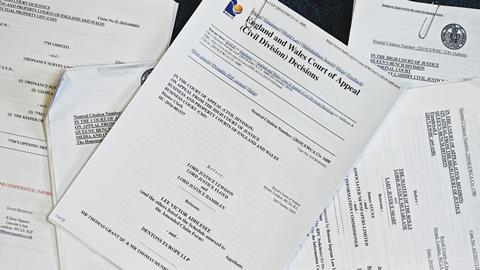Among the all-singing, all-dancing websites cluttering our web browsers with cookies, the British and Irish Legal Information Institute site stands out. Its text-only design has no fancy animations or sound effects. Its typographic design is… basic. No one asks users to sign in or prove that they are not robots. Remarkably for a service dependent on voluntary donations, no windows flash up begging for money.
The retro look of the site, now 20 years old, would be laughable but for one detail: it works. With a database of 411,000 searchable cases and 150,000 legislation items, BAILII is an essential port of call for anyone needing free online access to the state of the law. In the 12 months to last July, it had 14.4 million visits, up 26.3% in the year, making it the most popular online legal resource in the country. It is almost certainly one of the most trusted.
All this is done on a shoestring; BAILII has the equivalent of fewer than four full-time staff and a budget of some £200,000 a year. A quarter of this comes from the Ministry of Justice, which means that the government gets a cut-price way to tick the constitutional box marked 'open justice'.
But even as it celebrates its twentieth year with a new home page (including, daringly, a couple of colour pictures) and new search engine, a question mark is beginning to loom over the future of BAILII. The threat is not the perennial one of resources but from a growing feeling that in the digital age people expect court judgments to be presented in a very different way to that foreseen by BAILII's founders and maintained by a committed coalition of academics and judges.
Either BAILII will have to change its ways, or the government will have to start building its own repository of court judgments - something most citizens assume exists anyway.
BAILII's current model has two main shortcomings. First, its repository of judgments is incomplete. At the level of the High Court and Court of Appeal, the database is superb. And of course Supreme Court judgments have been online from day one. But as a record of courts and tribunals overall, BAILLI is patchy: Crown courts and extempore judgments do not figure and, as the site itself warns, the county court and magistrates' court records are 'very incomplete'. A lay litigant looking for background on, say, how a landlord-and-tenant dispute might fare, will come away with a very misleading impression of how the system works.
Even in the higher civil courts, it is very much up to individual judges to decide whether their judgments will be posted. With the best will in the world, this means that the database's catalogue will tend to favour cases that sitting judges find interesting. As it is hard to think of a more flawed way of picking a representative sample, the value of the BAILII archive as a base for scientific research - or for training artificial intelligence algorithms - is limited.
This incompleteness - and the fact that judges are in control - leads us to the second problem. BAILII's custodians are very particular about the uses to which their data is put. BAILII's terms do not allow judgments to be downloaded in bulk, or for data to be 'scraped' by software agents compiling knowledge bases. Google, for example, can't get past the case titles. This, officially at least, blocks the use of BAILII to train AI systems for predicting individual case outcomes - a development the judiciary views with extreme scepticism. Another spectre is of BAILII data being turned in to league tables - and presented to the public under headlines like: 'Enemies of the victims: Britain's 100 softest-touch judges'.
Such fears are understandable, and of course copyright holders are entitled to set conditions over the reproduction of their work. Publishers of court judgments have a particular responsibility to keep an eye on downstream dangers such as breaching reporting restrictions or enabling 'jigsaw identification' of protected individuals. But BAILII's model sits uneasily with the government's overall policy of encouraging 'public sector information' - from maps to census returns - to be released for research and innovation. The clash was illustrated last year when the Ministry of Justice blithely gave a French-based lawtech startup carte blanche to download BAILII in bulk - to be slapped down by the retired judge who chairs BAILII's board of trustees pointing out the ministry had no right to do so.
If the government really wants to turn the justice system into a world-beating cradle of lawtech innovation, this will have to be sorted out.
At the moment, this is a niche, almost literally academic, debate. Access to judgments is not something that practising solicitors, well served by commercial publishers and the Law Society's excellent library, often need to worry about. As for lay people, surely anyone with a legal problem would do better to consult an experienced solicitor than spend their nights browsing everything from Rylands v Fletcher to Magna Carta? Don't we already have enough wild-haired individuals in belted raincoats prowling the law courts with bundles of 'precedents' under their arm?
And if access to justice is the issue, surely the answer is to restore legal aid so that ordinary folk can once again afford proper advice rather than chucking more money at digital innovation?
Quite so. But open justice and accessible justice are not incompatible aims, especially where openness enables innovation. Over the past couple of years we have seen a flurry of interest in digital legal services as a way of filling the justice gap, a field of innovation we may call 'justicetech' to distinguish it from 'lawtech', which is mainly about automating law firms in the quest for efficiency. Now, the raw material of digital innovation is data. Thanks to the courts modernisation programme, HMCTS is about to experience a massive expansion in the amount of data at its fingertips. The explosion will be not just in quantity but in quality, because data collected as a by-product of operational processes is always more accurate than that collected as a bureaucratic afterthought. Court judgments, potentially from across the entire courts and tribunals system, are just the apex of the data pyramid.
To a Google or Amazon, this kind of data would be a goldmine. HMCTS appears to see it more as a Pandora's box. It has waited til the final phase in the modernisation programme to start work on an asset register listing what data it holds. (Any other organisation showing such tardiness could expect a sharp rap on the knuckles from the Information Commissioner's Office.) Whether that register will contain a comprehensive archive of court judgments remains to be seen. So far all we have is the assurance that a 'senior data governance panel', which met for the first time this month, will develop proposals over the next year.
In the meantime, HMCTS has renewed the contract under which BAILII posts judgments received from individual judges and their clerks, for a further year. What happens after that is anyone's guess. One possibility doing the rounds is that the National Archives will be given the task of setting up a comprehensive official database of judgments, along the lines of its excellent legislation.gov.uk website. Obviously no one is expecting every bench in the country suddenly to start producing judgments of the quality of the master of the rolls in full flow: the vast bulk of the archive would no doubt be automatically-generated transcripts of audio recordings. How that implicit surrender of power will go down with a judiciary acutely conscious of the need to preserve independence from government remains to be seen.
Another option would be for BAILII to be plugged directly in to HMCTS's data systems and given the resources and governance regime it needs to run a comprehensive free online service with terms and conditions catering for different kinds of users, including robots. As we have seen, that too is fraught with difficulty.
What is unarguable is that the tide is flowing in favour of open access to court outcomes. Judging by the inquiries I regularly receive from journalist colleagues, ordinary educated people are quite astonished that such a resource is not available already, as it is in France or our neighbouring common law jurisdiction Ireland.
Decisions need to be taken quickly about filling this gap. But even if they are, I have a feeling that we will be relying on BAILII's retro website for several years to come.





































11 Readers' comments